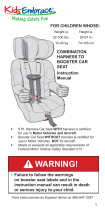
5
ENG
• Allow your child to take breaks during longer trips, and be sure that she /
he does not step out of the vehicle into traffic unattended.
• Always check and understand the vehicle’s operating manual regarding
how to use child restraint systems in your vehicle.
• The vehicle seat back must be in the upright position as recommended
by the vehicle manufacturer and locked in position (in vehicles with
fold-down backrests, through-loading facilities etc.).
• NEVER allow a child to play with this booster car seat. This booster car
seat is NOT a toy.
• Discontinue use of this booster car seat if it was used in a crash where
speed exceeded 10 mph. It must be returned to kiddy USA for
inspection and replacement if necessary.
• Discontinue use of this booster car seat after 8 years from the
manufacture date noted on the product.
• Do not use any accessories or parts supplied by other manufacturers.
• Do not make any modifications to the booster car seat; doing so will
reduce its effectiveness in a crash.
• Only transport a child properly secured in the booster car seat. Never
transport parcels or other objects in the booster car seat.
• Improper handling during installation or removal can cause damage to
your vehicle (e.g. paint damage or tears in the seat covers etc.) as well
as to the booster car seat.
• Vehicle seat covers made from materials such as velour, leather etc.
may show wear marks after using your booster car seat.
• You must register your booster car seat to be reached in the event of a
product recall or safety notice. Please take the time to fill out the
registration card and register today. You could also register your product
online:
http://kiddyusa.com/registration_carseat.html
• Always use the child safety locks in your vehicles passenger doors, if
available.
• Make sure that none of the booster car seat's parts are caught in doors
or reclining seats.
DEATH or SERIOUS INJURY can occur
WARNING
!






















